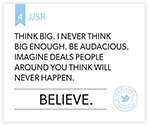In the Analytical World of News, Brands Still Matter
Ten short years ago, the news business was a monopoly, with editors running command and control of the news we received. Content production was based on an editor’s judgment of what was important. There was no real-time way to know which stories were read the most or had the most impact.
Thanks to the infiltration of analytics into everything digital, we, the audience, are now the engines of the news business. And many of us are also the producers.
With Omniture, we saw the beginning of this transformation, as sites used our analytics software to optimize content consumption. Today, analytics still define and direct a healthy portion of the stories that are written. However, the power of brand strongly influences what gets consumed.
If you think about analytics as bringing an audience to the water, brand is often what makes them drink. Brands built by news outlets, news reporters and the people in our networks whom we respect all go a long way in determining what content makes it through our human filter after technology has done its job serving up the content.
For the CEO-as-a-consumer segment, the importance of brand is clearly evident. In a new report from Domo and CEO.com, the Wall Street Journal has held its place as the number one source for business news amongst chief executives. This brand still wields tremendous influence despite the rise of countless online publications. According to our CEO respondents, the Wall Street Journal was also the publication they turned to most often for business news 10 years ago.
I like to see what people in my business and personal networks are reading. That’s why tools like Twitter, LinkedIn and Flipboard are so valuable to me, and why, according to our report, they are gaining in importance to other CEOs. I know I am more likely to read a story if it’s been recommended by someone I know or trust.
This has massive implications for media. It’s also why I believe publications such as Forbes and Fast Company, and new media sites like LinkedIn, are becoming less single, traditional publications and more publishing platforms. They are part of the open-world order that allows people get more of what they want, and less of what they don’t.
I believe the social nature of news is unstoppable – not only because it’s smarter, but because it is based on a level of trust that has already been established by the personal brands of the people who produce or recommend the content. Beyond the analytics, content connected to trusted entities – people, publications or companies – creates the ideal environment to foster meaningful engagement.
We’ve taken this concept about connecting data to trusted entities into consideration when designing Domo. When data is taken out of dark silos and put into the light, conversations start to happen amongst different stakeholders and you start to find new value in data that you may never realized existed. It’s the same with news – getting different insights into something you may have once taken for face value, helps you understand the world in a different way.
Josh









